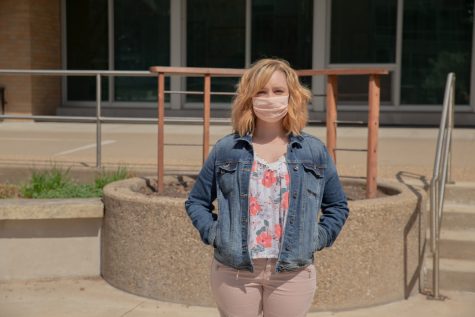Remote internships: part of the new normal
A national survey found that 38 percent of college students are “at least somewhat interested” in remote internships
April 18, 2021
Last summer, University of Iowa junior Elizabeth Wagner worked eight-hour shifts at T.J. Maxx. When 5 p.m. hit, she returned home and logged onto Zoom to attend meetings for her remote internship for another two to three hours.
The remote internship, based in Des Moines, was a last resort for Wagner, who found the internship in her line of study at the UI, environmental policy and planning.
Wagner had lined up three in-person internships for summer 2020 but was left without any after COVID-19 limited in-person experiences.
“Especially in my major, you need internships and experience to build your résumé,” she said. “To not have any options was just kind of stressful and I kind of felt helpless.”
Wagner said her virtual internship allowed her to communicate daily with people from across Iowa on Zoom, but she prefers in-person experiences.
“I think you can make more connections with in-person internships and build a stronger relationship with the people you’re working with, rather than online virtual meetings and Zoom calls,” she said.
A survey of 2,000 college students conducted by Inside Higher Ed and College Pulse found 38 percent of students are “at least somewhat interested” in a remote internship during college, and 18 percent of students are extremely interested.
RELATED: University of Iowa student interns help members of local senior center sign up for vaccine
UI Associate Director of Experiential Education Jennifer Noyce said employers who have internships are figuring out what is going to be safe or not safe for students during the pandemic. Noyce said she is still seeing a lot of remote-only opportunities for this summer.
“They are keeping in-person experiences on the table for students and are saying, ‘Oh maybe at the end of the summer or depending on how the rollout goes maybe you’ll come on-site or toward the end,’” she said.
Noyce said a benefit of remote experiences is that many more students can access internships because they don’t have to pay for travel or for housing in a new location.
“Now students can apply and then, when they get offers, they can have a real choice to make,” Noyce said.
Zoe Trager, a junior at the UI, was a remote-only intern at Kane Communications Group
in Milwaukee, Wisconsin during the fall 2020 semester, while balancing her schoolwork. Trager said she applied for the position after she was connected through the UI School of Journalism and Mass Communication.
She said the internship ran surprisingly smoothly for being completely online and remote in a new location.
“I’m not actually from Milwaukee, so it was kind of interesting because they talked about things that are going on in Milwaukee … and I just would have no frame of reference, but it was still really fun and everyone was super helpful,” she said.
If students cannot get an internship because of COVID-19 restrictions, Noyce said what a student does as an alternative to an internship will give them an advantage because employers want to see initiative.
“Employers understand,” Noyce said. “If they ask what you did last summer, tell them you learned a new skill or you decided to create a podcast or you took an extra class.”





















